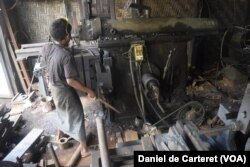A boy's small hands expertly operate a circular saw in a workshop just outside the central Myanmar city of Mandalay. Although only 13 years old, he has been doing this work for about a year, so says he feels safe working with the machine and its fast-spinning blade.
He can earn about $3 per day with this work, more than the country’s recently introduced minimum wage, and says he is learning skills that will enable him to earn more in the future.
He gives all his earnings to his mother, a poor farmer. His father has left the family and become a Buddhist monk, the boy says.
“My mother asked me to go to work,” he says. “At my home there is no food to eat. That’s why I come to work. The boss is good to me and feeds me.”
This boy's predicament may be shocking, but it is all too common in Myanmar. The country has since 2011 been undergoing a political transformation and is seeing high headline rates of economic growth. But when a new government led by Aung San Suu Kyi’s National League for Democracy takes power next year, it will inherit a broken education system and dire poverty in many rural areas that are fueling rampant child labor.
A census conducted in 2014 found that 24 percent of children aged between 10-17 are involved in the labor force. The government concedes that at least half a million children are working and out of school, but campaigners reckon that number could be much higher.
ILO works to address issue
The International Labor Organization has been working with the government, employers and trade unions to address the issue. Selim Benaissa, the ILO’s chief technical advisor on the project, says that eradicating the scourge of child labor is not as simple as enforcing laws on the minimum age for workers.
“Definitely going to a workplace and firing all the children and youths at one time is not the proper solution in the long term,” he said. “The risk is that, as has been seen in other countries, those children will work anyway.
“They might be at high risk of falling into worse forms of child labor such as child prostitution or very hazardous work, for example.”
The problem encompasses many deeper social issues, and therefore needs cross-agency cooperation from the government, he added. The issues involved include a lack of access to education in many areas, armed conflict in parts of the country, internal migration, and the simple poverty that affects families like San Lin’s.
Those who employ child laborers insist that they are doing their young employees, and their families, a service, in lieu of proper social services provided by the government.
Employers defend practice
Maung Thant, who runs the small factory in which the boy and another underage worker toil, claims that he is not exploiting the children. “I use these child laborers to improve their lives,” he said.
Further, he insisted, his employees had been out of school for too long now to ever catch up, and were better served picking up practical skills in his workshop.
“If they can get a vocational education, when they have grown up they can go anywhere an they can find a good job,” he said.
The most visible example of the problem is in the country’s teashops, where young boys from rural areas are regularly employed full time, living and sleeping in the shop itself and sending their meager salary home to contribute to their family’s income.
Tim Aye-Hardy founded the MyME project after returning from the United States to Myanmar, the country of his birth, as a political opening began in 2012. The project brings underage tea shop workers into buses refitted as mobile schools, to provide basic education during the time they are not working.
More than 850 children are now benefiting from the project, but Tim Aye-Hardy said that to truly address the problems causing child labor in Myanmar will be difficult.
“For parents, it’s about daily survival, education becomes secondary,” he said. The hidden costs of education, like books and uniforms, were a barrier, he said. And once children get into the classroom, the standard of education they receive is poor.
“This is happening across the country, without reforming the education system we’re going to keep seeing a lot of kids dropping out,” he said.












